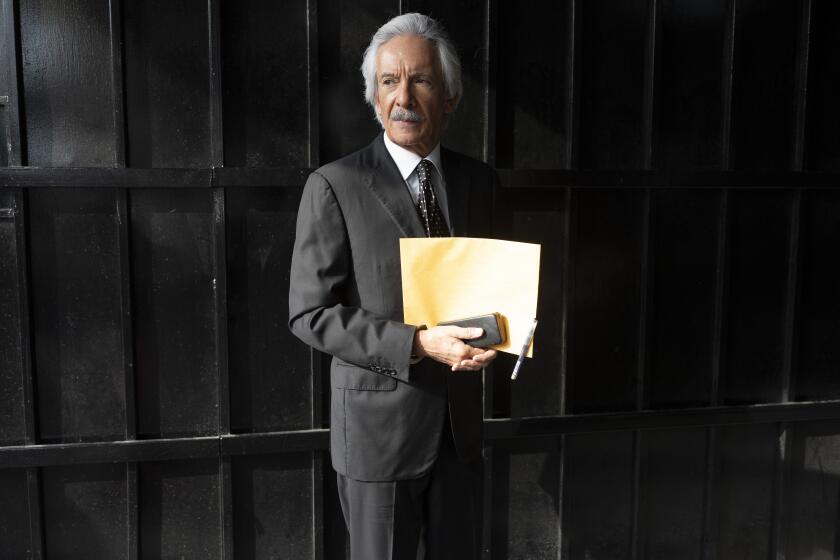ISRAEL UNDER SIEGE : Likud Would Battle Terror Without Arafat
Even as Prime Minister Shimon Peres moved Tuesday to rebuild this nation’s shattered sense of personal security by taking tough measures against the militant Hamas movement, leaders of the opposition Likud Party were insisting that they could do better.
Strip away the rhetoric, and the primary difference between Likud’s proposals and what the Israeli government is already doing is this: Peres is still trying to keep alive the Oslo peace accord that Israel signed with the Palestine Liberation Organization in September 1993. He is still trying to work with Palestinian Authority President Yasser Arafat to stop the wave of bombings.
Likud, in contrast, advocates shoving Arafat aside and reasserting a stronger Israeli military presence in areas of the West Bank now run by the Palestinian Authority. A frightened and enraged public seemed more than willing to listen to Likud on Tuesday, as the party’s leaders proposed the blockading of the Gaza Strip and other dramatic prescriptions.
The Israeli army arrested dozens of Palestinians said to be members of Hamas, sealed the family homes of suspected bombers and shut down several charitable, religious and educational institutions in East Jerusalem and the West Bank with alleged links to the militant group. But Israelis wanted more.
Every national newspaper, regardless of political affiliation, ran editorials urging the government to back its verbal declaration of all-out war against Hamas with military action.
“The formula that the peace process itself will provide Israel’s citizens with security has been scrapped,” observed the center-left newspaper Haaretz.
“The imperative of the hour is to enter their [the Palestinian militants’] midst. Without hesitation, without thoughtfulness, without mercy,” said Maariv, a populist tabloid, in an editorial signed by commentator Yosef Lapid. “We will descend upon their lives day and night until they have found no respite for their murderous souls.”
“The public wanted to see tank battalions within Gaza yesterday and regiments of paratroopers dispersed among the homes,” wrote Menachem Shalev, diplomatic correspondent for Maariv.
And that is what Likud promises it will deliver if it manages to unseat the Labor-led government in national elections scheduled for May 29. Just a few weeks ago, Likud was the underdog in the race, fighting an uphill battle against a government riding a wave of public sympathy in the wake of Prime Minister Yitzhak Rabin’s Nov. 4 assassination by a right-wing Jewish law student.
But since the recent bomb attacks began Feb. 25, Peres has run neck and neck with Likud leader Benjamin Netanyahu. No one expects the next round of polls, due out Friday morning, to show anything but gains for Likud and Netanyahu.
At a news conference Monday night, Netanyahu said he had delivered a detailed proposal to Peres on how to stop suicide bombing attacks.
“The organizers and supporters of terrorism should be hit,” Netanyahu said. The government must acknowledge, he said, that its policy of relying on Arafat as a partner in fighting terror has failed. The government “must loosen the chains and restrictions imposed on the security forces in this war.”
Ariel Sharon, a Likud kingmaker and former defense minister, offered more specific advice. Urging that elections be postponed for a year, Sharon said the government should form a special security Cabinet that would include Likud members and would direct the fight against terror.
Sharon dismissed the government’s plan to spend about $100 million building fences and electronic monitoring stations between the West Bank and Israel.
“We should take the initiative, stop the defense and start the offense without taking into account any restriction set by the Oslo agreement,” Sharon said in an interview published in Haaretz on Tuesday. “Offense is the answer.”
Specifically, Sharon advocated the reassertion of control by Israel over areas of the West Bank where it now shares security responsibility with the Palestinian Authority. He said the extended families of suicide bombers should be deported; the bombers should be denied a Muslim burial; a sea blockade should be imposed on the Gaza Strip; and the “terrorist infrastructure should be hit wherever it is--the headquarters and commanders, the helpers, leaders and inciters.”
Tzachi Hanegbi, a hard-line Likud member of parliament who is close to Netanyahu, went even further than Sharon.
“We have to take over every centimeter of Judea and Samaria again,” said Hanegbi, using the biblical terms for the West Bank. Israeli troops withdrew from West Bank towns last year and are supposed to make further withdrawals this year.
Israel’s troubles began, Hanegbi insisted, when it withdrew from the towns and villages and lost contact with the network of thousands of Palestinian informers who had helped Israel control the area since its capture from Jordan during the Mideast War in June 1967.
“The framework we had collapsed because we are being perceived as an entity that is fading away from those areas and cannot guarantee the lives of the people who were helping us,” Hanegbi said in an interview with The Times. “We don’t have real information in real time about the presence of terrorist leaders. When we were in power, there was no immunity for Hamas leaders.”
Analysts scoff at the notion that Likud would actually tear up the Oslo accord if it came to power in May.
“Most Israelis don’t want the army to go back into Gaza, Nablus and Ramallah,” said Efraim Inbar, director of the BESA Center for Strategic Studies at Bar Ilan University and a specialist in Israeli military strategy. “Netanyahu is a pragmatist. He knows that reoccupying all of the territories would not be popular.”
But the party’s tough-sounding prescriptions are striking a chord with Israelis because they are more familiar than Peres’ commitment to working with Arafat to fight terror, said political scientist Yaron Ezrachi.
“This country has internalized, since 1948 at least, the notion that the best defense is offense,” said Ezrachi, who teaches at Jerusalem’s Hebrew University, referring to the year Israel gained independence. “The whole strategy was to never lose the initiative, to keep the element of surprise. The Zionist notion is that Jews are no longer victims. So the idea of entrenching yourself is contradictory to that central notion.”
By opting to separate the West Bank from Israel and pour security reinforcements into the major cities, Labor is undercutting the advantages peacemaking with the Palestinians once seemed to offer, Ezrachi said.
“Israelis were told that by losing control over the territories they were gaining access to the region,” Ezrachi said.
“Suddenly, the government is talking about building this Chinese wall and making the country even smaller. It contradicts the whole psychology of the peace process.”
More to Read
Start your day right
Sign up for Essential California for news, features and recommendations from the L.A. Times and beyond in your inbox six days a week.
You may occasionally receive promotional content from the Los Angeles Times.






